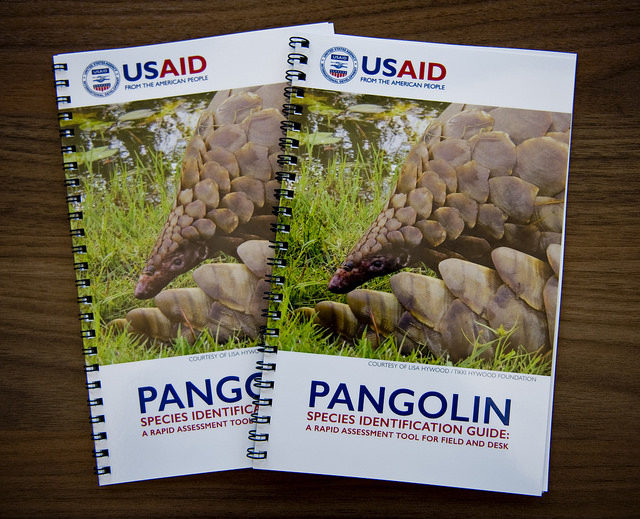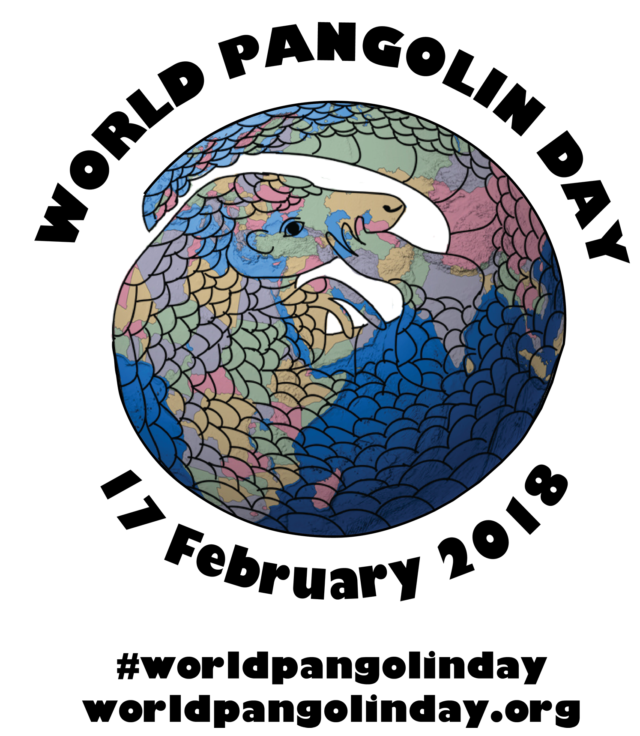
BANGKOK, February 16, 2018 – The United States Agency for International Development (USAID) is marking World Pangolin Day on February 17 by unveiling a new guide to help law enforcement officers identify species and origins of pangolins, the world’s most trafficked mammals, in a bid to curb the illegal trade in wildlife.
Developed by the USAID Wildlife Asia project, the Pangolin Species Identification Guide: A Rapid Assessment Tool for Field and Desk will make it easier for law enforcement officers to identify pangolins and pangolin parts — such as scales and skins — they may encounter in the field. The guide provides species identification characteristics and range maps, allowing officers to identify pangolins and their likely country of origin.
“This guide will be a great benefit for frontline law enforcement officers who work at entry ports, such as international airports, seaports and land border crossings, to effectively enforce any laws relating to pangolins,” said Pinsak Suraswadi, Deputy Director General of Thailand’s Department of National Parks, Wildlife and Plant Conservation (DNP).
In 2017, authorities seized 32 tons of pangolin scales and 563 live pangolins in Southeast Asia and China. According to recent research published in Conservation Letters, up to 2.7 million pangolins are being killed every year in Central Africa alone. In many cases seized pangolins are not identified properly, making it difficult to know the original source of the trafficked individuals.
“We have to act now to protect pangolins, as they are at high risk of extinction,” said acting USAID Regional Development Mission for Asia Director Richard Goughnour. “This guide is one important contribution to better equip law enforcement officers to succeed in fighting this crime.”
USAID Wildlife Asia gave a preview of the guide at the November 2017 Convention on International Trade in Endangered Species of Wild Fauna and Flora (CITES) Standing Committee meeting in Geneva. “The CITES Secretariat has already made the guide available on the CITES Virtual College, the World Customs Organization Environet platform, and more widely distributed it among the International Consortium on Combating Wildlife Crime partner organizations, to make it available as widely as possible to officers responsible for wildlife law enforcement in the front lines,” said CITES Secretary-General John E. Scanlon.
USAID Wildlife Asia will further support pangolin identification with plans to roll out in late 2018 an interactive smartphone application to aid law enforcement and customs officials in the identification of pangolins and pangolin products.
USAID Wildlife Asia and the DNP will use the new guide at Thailand’s first-ever pangolin husbandry workshop to train customs and relevant law enforcement authorities to improve survival and release rates of live pangolins confiscated in the illegal wildlife trade.
All eight species of pangolin, four in Asia and four in Africa, are illegal to trade and are listed in CITES Appendix I, the highest level of international protection. Thailand is home to two pangolin species, the Sunda pangolin (Manis javanica) and the Chinese pangolin (Manis pentadactyla). The primary destinations for pangolin scales and meat are China and to a lesser extent, Vietnam. Criminals frequently use Thailand as a transit point in the illegal pangolin trade.
The Pangolin Species Identification Guide is available on www.usaidwildlifeasia.org in English and Thai and will also be translated in Indonesian, Malaysian, Mandarin and Vietnamese. Mobile application is available at Play Store (https://goo.gl/NGpkzJ) and App Store (https://goo.gl/T9UVMQ)
About USAID Wildlife Asia
The USAID Wildlife Asia Activity works to address wildlife trafficking as a transnational crime. The project aims to reduce consumer demand for wildlife parts and products, strengthen law enforcement, enhance legal and political commitment, and support regional collaboration to reduce wildlife crime in Southeast Asia, particularly: Cambodia, Laos, Thailand, Vietnam and China. Species focus of USAID Wildlife Asia include elephant, rhinoceros, tiger and pangolin. For more information, please visit www.usaidwildlifeasia.org


